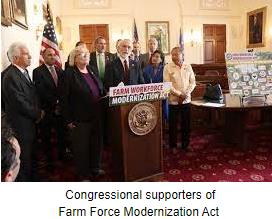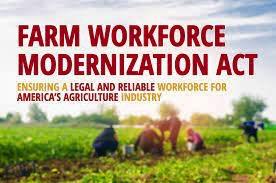 The Farm Workforce Modernization Act (H.R. 4319) was reintroduced into the 118th Congress after attaining bipartisan support in the two previous Congressional terms.
The Farm Workforce Modernization Act (H.R. 4319) was reintroduced into the 118th Congress after attaining bipartisan support in the two previous Congressional terms.
The Act is sponsored by Representative Zoe Lofgren (D-CA) and Dan Newhouse (R-WA) and supported by eight prominent members of the House representing both parties and diverse areas of the nation.
Representative Lofgren stated, “In the past few years we’ve seen labor shortages contribute to high food prices. If it wasn’t obvious before, the pandemic made clear that our country’s agriculture workforce rules are in dire need of reform. The Bill has been negotiated since 2019 with input from agricultural producers, labor organizations and farmworker advocates.
Major provisions include:
- A process for farmworkers to seek certified agricultural worker status that can be renewed indefinitely with continued farm work.
- A requirement for thorough background checks and a requirement of a criminal-free record.
- Long-term workers can earn a path to permanent resident status (green card) depending on years of agricultural work performed.

- The H-2A visa process would be streamlined using an electronic platform allowing employers to file a single petition for staggered seasonal labor needs, introducing electronic job postings and reducing costs for visa processing.
- Wage scales would be updated with a disaggregation according to occupation, distinguishing among crop, livestock and machine workers.
- Regulating contracts and eliminating wage fluctuations.
- Providing 20,000 H-2A visas per year for three years with preference for dairy and poultry year-round agricultural employers.
- Establishing a portable agricultural worker pilot program for 10,000 workers to allow employment without filing petitions for each change in employer.
- Improvement of housing for workers and making available subsidies under rural housing loan and grant programs.
- Establishing a program to register and control foreign labor recruiters with some associated with corruption and exploitation.
- The Act would establish a mandatory nationwide E-Verify system and include due process protection for workers who are incorrectly rejected by the system.